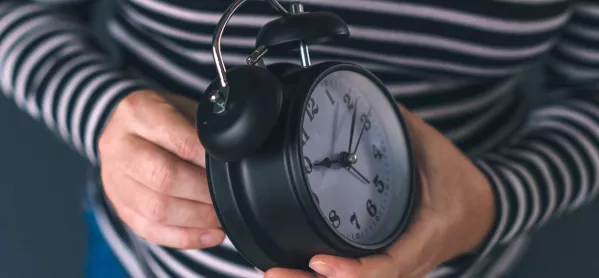- Home
- The clocks go back - and we’re in the winter of Covid
The clocks go back - and we’re in the winter of Covid

I was intrigued to hear that scientists have discovered the shortest unit of time ever: the zeptosecond. It’s mind-boggling that the zeptosecond is a trillionth of a billionth of a second, or a decimal point followed by 20 zeroes and a one.
Apparently, this latest finding makes our measurement of time even more accurate than ever.
But how can we possibly notice the passing of all of those units in just one second, let alone count them? Perhaps it’s not just the fact that these units are too minute (if you’ll pardon the pun) for our brains to latch on to, but that our internal chronometers are rather more subjective.
There’s the well-known phenomenon that sets holidays at a faster pace than school terms: weekends fly by, while days in school drag - more in the autumn and winter terms than in the summer, admittedly.
Coronavirus: Schools operating on Covid time
Even the timetable, which measures out lessons in even slices, fails to deliver a well-balanced experience. Morning sessions start easily enough, reach the optimum pace just after break, and then sag into lunchtime.
After that, the body’s on double time: the mind may be teaching but the digestion’s got a lot to absorb during the afternoon. Lessons seem twice as long. And if there’s Inset or a meeting before the evening commute home, time seems to stand still.
That’s just in normal years. Since September, we’ve been operating on Covid time, when blended learning manages to embody the worst of all worlds, and to devour even more time.
It’s like riding two horses at once: dual planning that requires at the very least an early set-up on Teams or its equivalent, plus teaching in dual locations, virtual and real. Do the students at home work at the same pace as their contemporaries in the classroom? Can you post feedback in chat at the same time as teaching those in front of you?
Worst of all is when the clocks go back…and so, it seems, do we.
Facing the bleak midwinter
Before the half-term holiday, you can get home from school in the light. Afterwards, you feel condemned to eternal gloom, as even the morning lightness contracts by December. The extra hour we had in bed at the weekend is no consolation for the rapid descent of darkness at the end of the day, especially in this strangely surreal year, when the timetable operates more intensively than ever.
The all-too-brief respite of the half-term holiday soon vanishes, like the mid-afternoon daylight, as November unfolds. You have to put your head down and keep going past Bonfire Night (which seems all but cancelled this year, as we socially distance) and Remembrance Day.
I’ve often wondered whether it would be simpler just to hibernate rather than exercise the willpower to wrestle myself out from under the warm duvet to meet the morning chill. Daylight only happens outside the classroom. Vitamin D levels are sinking, and so is the stamina.
The dark evening commute home, which should really signal the end of the working day, is just a prelude to marking and planning that seems to take so much longer than in September.
Testing teacher stamina
And this year it’s more of a struggle than ever. For families in areas under the most severe Covid-19 restrictions, there’s little relief even at the weekends.
November tests our stamina to the full, especially in times like these. We all need light, not just at the end of the tunnel, but all the way along it. But where from?
We need time off from the day job. We need a professional life that allows us to take away a sense of achievement, and that offers us more pleasure in the classroom experience. This is the time for schools to reduce the bureaucracy and pressure on results, to downplay the anxiety about pupil progress and results next summer.
In that way we might regain a balance between perceived and actual time, professional and personal time, to help us all get through November.
In the meantime, half-term holidays are with us. Each zeptosecond is precious, even if our brains aren’t finely tuned enough to count every single one of them. Perhaps the memories we generate will have the power to sustain us through to Christmas.
Yvonne Williams is head of English and drama in a secondary school in the South of England. She has contributed chapters on workload and wellbeing to Mentoring English Teachers in the Secondary School, edited by Debbie Hickman (Routledge)
Keep reading for just £1 per month
You've reached your limit of free articles this month. Subscribe for £1 per month for three months and get:
- Unlimited access to all Tes magazine content
- Exclusive subscriber-only stories
- Award-winning email newsletters



